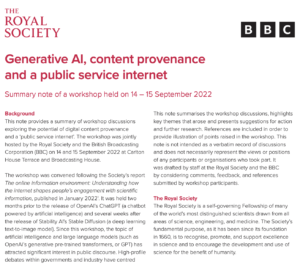Categories
Archives

In September 2022, IPTC Managing Director Brendan Quinn was invited to attend a workshop at the Royal Society in London, held in conjunction with the BBC. It was convened to discuss concerns about content provenance, threats to society due to misinformation and disinformation, and the idea of a “public-service internet.”
A note summarising the outcomes of the meeting has now been published. The Royal Society says, “This note provides a summary of workshop discussions exploring the potential of digital content provenance and a ‘public service internet’.”
The workshop note gives a summary of key takeaways from the event:
- Digital content provenance is an imperfect and limited – yet still critically important – solution to the challenge of AI-generated misinformation.
- A provenance-establishing system that can account for the international and culturally diverse nature of misinformation is essential for its efficacy.
- Digital content provenance tools present significant technical and ethical challenges, including risks related
to privacy, security and literacy. - Understanding how best to embed ideas such as digital content provenance into counter-misinformation strategies may require revisiting the rules which dictate how information is transmitted over the internet.
- A ‘public service internet’ presents an interesting and new angle through which public service objectives can shape the information environment; however, the end state of such a system requires greater clarity and should include a wide range of voices, including historically excluded groups.
The IPTC is already participating in several projects looking at concrete responses to the problems of misinformation and disinformation in the media, via our work theme on Trust and Credibility in the Media. We are on the Steering Committee of Project Origin, and work closely with C2PA and the Content Authenticity Initiative.
The IPTC looks forward to further work in this area.The IPTC and its members will be happy to contribute to more workshops and studies by the Royal Society and other groups.
Categories
Archives
- February 2026
- January 2026
- December 2025
- November 2025
- October 2025
- September 2025
- August 2025
- July 2025
- June 2025
- May 2025
- April 2025
- March 2025
- February 2025
- January 2025
- December 2024
- November 2024
- October 2024
- September 2024
- August 2024
- July 2024
- June 2024
- May 2024
- April 2024
- March 2024
- February 2024
- December 2023
- November 2023
- October 2023
- September 2023
- August 2023
- July 2023
- June 2023
- May 2023
- March 2023
- February 2023
- January 2023
- December 2022
- November 2022
- October 2022
- September 2022
- August 2022
- July 2022
- June 2022
- May 2022
- April 2022
- March 2022
- February 2022
- January 2022
- December 2021
- November 2021
- October 2021
- September 2021
- August 2021
- July 2021
- June 2021
- May 2021
- April 2021
- February 2021
- December 2020
- November 2020
- October 2020
- September 2020
- August 2020
- July 2020
- June 2020
- May 2020
- April 2020
- March 2020
- February 2020
- December 2019
- November 2019
- October 2019
- September 2019
- July 2019
- June 2019
- May 2019
- April 2019
- February 2019
- November 2018
- October 2018
- September 2018
- August 2018
- July 2018
- June 2018
- May 2018
- April 2018
- March 2018
- January 2018
- November 2017
- October 2017
- September 2017
- August 2017
- June 2017
- May 2017
- April 2017
- December 2016
- November 2016
- October 2016
- September 2016
- August 2016
- July 2016
- June 2016
- May 2016
- April 2016
- February 2016
- January 2016
- December 2015
- November 2015
- October 2015
- September 2015
- June 2015
- April 2015
- March 2015
- February 2015
- November 2014